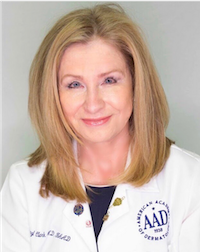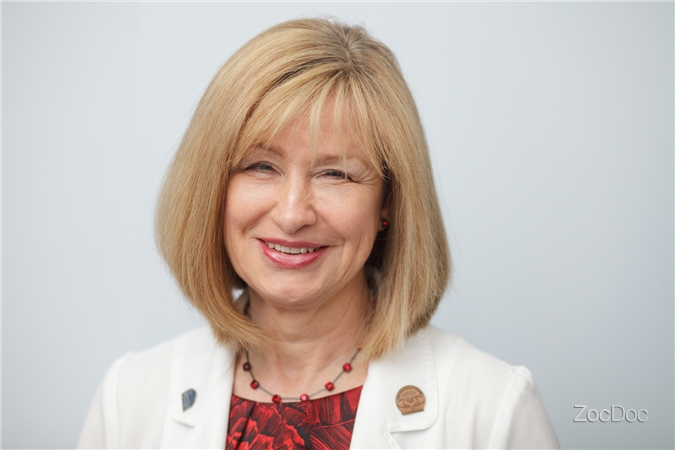About Dr. Sheryl Clark, MD
Sheryl Clark, MD is a board-certified Manhattan dermatologist providing medical and cosmetic dermatology care to patients in New York City. Dr. Clark is committed to providing only the best in aesthetic and preventative dermatology.
Dr. Clark fulfilled her lifelong interest in wellness care and preventative medicine by creating a practice grounded in the tenets of traditional medicine and enhanced by those of integrative functional medicine. Her approach to patient care considers lifestage and -style's impact on health, vitality, and beauty as well as longevity, inflammation, cancer, diabetes, heart disease, stroke, and other disease.
Dr. Clark's approach to treating skin disorders and optimizing skin health and beauty may include prescription and/or non-prescription medication, nutritional counseling and supplementation, exercise guidance, or stress reduction methods. Dr. Clark has developed treatment algorithms based on peer-reviewed scientific research and more than 20 yrs of clinical experience.
Dr. Clark is a highly skilled advanced injector of all dermal and deep fillers and botulinum medications with over 20 years’ experience, and owns and operates numerous medical devices for the treatment of the full range of aesthetic concerns of her patients, and knows that the best responses to aesthetic procedures are obtained when patient’s health and nutritional status are optimized.
Dr. Sheryl Clark was was a student of Anna Freud, a therapist and a medical editor in the UK, prior to receiving her medical degree (MD) from Case Western Reserve University School of Medicine (CWRU)
Dr. Clark was a research fellow for the CWRU Schistosomiasis Control Program in Kenya, Africa and engaged in basic science research for 4 yrs during her residency at Washington University Medical Center/Barnes Hospital where she served as Chief Resident. Dr. Clark was a full-time professor at New York Presbyterian Hospital/Cornell before founding The Center for Aesthetic and Preventative Dermatology at East 61st Street and Park Avenue. She is now Clinical Assistant Professor at Cornell University Medical College and Assistant Attending Physician at The New York Presbyterian Hospital.
Dr. Clark fulfilled her lifelong interest in wellness care and preventative medicine by creating a practice grounded in the tenets of traditional medicine and enhanced by those of integrative functional medicine. Her approach to patient care considers lifestage and -style's impact on health, vitality, and beauty as well as longevity, inflammation, cancer, diabetes, heart disease, stroke, and other disease.
Dr. Clark's approach to treating skin disorders and optimizing skin health and beauty may include prescription and/or non-prescription medication, nutritional counseling and supplementation, exercise guidance, or stress reduction methods. Dr. Clark has developed treatment algorithms based on peer-reviewed scientific research and more than 20 yrs of clinical experience.
Dr. Clark is a highly skilled advanced injector of all dermal and deep fillers and botulinum medications with over 20 years’ experience, and owns and operates numerous medical devices for the treatment of the full range of aesthetic concerns of her patients, and knows that the best responses to aesthetic procedures are obtained when patient’s health and nutritional status are optimized.
Dr. Sheryl Clark was was a student of Anna Freud, a therapist and a medical editor in the UK, prior to receiving her medical degree (MD) from Case Western Reserve University School of Medicine (CWRU)
Dr. Clark was a research fellow for the CWRU Schistosomiasis Control Program in Kenya, Africa and engaged in basic science research for 4 yrs during her residency at Washington University Medical Center/Barnes Hospital where she served as Chief Resident. Dr. Clark was a full-time professor at New York Presbyterian Hospital/Cornell before founding The Center for Aesthetic and Preventative Dermatology at East 61st Street and Park Avenue. She is now Clinical Assistant Professor at Cornell University Medical College and Assistant Attending Physician at The New York Presbyterian Hospital.
Patient Education Resources
Does the food I eat affect my acne?
There is some evidence to suggest that diet can play a role in the development of acne. Studies have found that a diet high in sugar and processed foods can increase the risk of developing acne. Diets...
There is some evidence to suggest that diet can play a role in the development of acne. Studies have found that a diet high in sugar and processed foods can increase the risk of developing acne. Diets...
If I have psoriasis, am I likely to get arthritis?
Psoriasis is a chronic skin condition that causes red, scaly patches on the skin. It affects about 2-3% of the population. People with psoriasis are at an increased risk of developing a form of arthri...
Psoriasis is a chronic skin condition that causes red, scaly patches on the skin. It affects about 2-3% of the population. People with psoriasis are at an increased risk of developing a form of arthri...
Psoriasis Medication Savings & Support
Click on the product image to access medication savings or support services offered by the manufacturer In most cases, this form must be submitted along with proof of having purchased the medi...
Click on the product image to access medication savings or support services offered by the manufacturer In most cases, this form must be submitted along with proof of having purchased the medi...
What is atopic dermatitis?
Atopic dermatitis, also known as eczema, is a chronic, inflammatory skin condition that causes dry, itchy, and scaly skin. The condition is characterized by symptoms such as:Dry, itchy skin: The skin ...
Atopic dermatitis, also known as eczema, is a chronic, inflammatory skin condition that causes dry, itchy, and scaly skin. The condition is characterized by symptoms such as:Dry, itchy skin: The skin ...
What is microneedling?
Microneedling is a cosmetic procedure that involves using a device with fine needles to create tiny punctures in the skin. The needles are typically between 0.5mm and 2.5mm in length, and are used to ...
Microneedling is a cosmetic procedure that involves using a device with fine needles to create tiny punctures in the skin. The needles are typically between 0.5mm and 2.5mm in length, and are used to ...
Education & Training
- Residency: Washington University - Barnes-Jewish Hospital
- Residency: Mount Sinai Medical Center
- Medical School: Case Western Reserve University School of Medicine
Professional Affiliations
Sheryl Clark MD

Comfort and convenience are the hallmarks of Dr. Clark’s office operations. To ensure your convenience, below is the information you need about our hours, location, appointment scheduling, insurance acceptance and billing.
